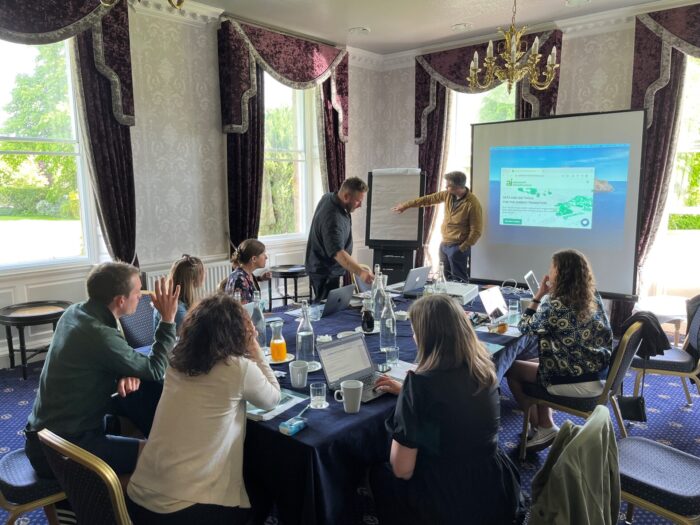Projects

The Leeds Relational Energy Group brings together researchers working on a diverse array of topics focused on the social and financial dynamics of energy use, domestic retrofit, and sustainable infrastructure. LREG uses a relational approach to energy use in homes, working with stakeholders to design better policy and interventions for fair and low-carbon futures.
Through a series of externally funded projects, the team have designed a research approach rooted in economic sociology to understand the key energy challenges of our time: how to support and motivate people to transform their homes and communities for better health and better climate outcomes.
Work to date includes the social relations of energy use in energy poor households (Middlemiss), alternative financing of energy projects through community municipal investments (Davis) and spatial and social analysis of carbon footprinting and accounting (Owen). This work was brought together in 2021-2023 via the landmark ‘Whole Person, Whole Place’ project (UKERC), which examined the potential for a relational approach to improve retrofit policy for ‘able-to-pay’ households, including understanding responses to energy grants.
- Whole Person, Whole Place
- Social Relations of Retrofit
- Evaluating the Leeds Retrofit Accelerator Hub
- Energy Poverty and Social Relations
- Local Climate Bonds
- Energy Demographics
Whole Person, Whole Place
Led by Professors Lucie Middlemiss & Mark Davis
This project brought together an interdisciplinary team of social scientists to explore the barriers to domestic retrofit beyond just financial constraints. By examining case studies in Brighton, Glasgow, and Leeds, the team investigated the role of social relations in shaping retrofit decisions. They found that support from neighbours, friends, family, and local tradespeople significantly influenced people's decisions. Additionally, the project highlighted how different sources of money within households, such as savings or inheritance, are preferred for funding retrofits over borrowing. The findings suggest that retrofit policies should leverage these social dynamics and existing networks of local trust to enhance uptake.
Social Relations of Retrofit
Led by Dr Ruth Bookbinder
This project, an extension of the Whole Person, Whole Place study, examined the high number of domestic energy incentive applications among low-income homeowners with Asian backgrounds in Bradford. Interviews revealed that while interest in these schemes was high, a third of applicants did not complete the retrofit process due to insufficient support after the initial recruitment stage. The findings suggest a need for more relational support throughout the entire retrofit process to ensure successful project completion.
Evaluating the Leeds Retrofit Accelerator Hub
Led by Dr Ruth Bookbinder
Building on the Whole Person, Whole Place project, this initiative aims to integrate a relational framework into retrofit schemes in Leeds and explore scalable delivery methods. Partners include Leeds City Council, Lloyds Bank, Octopus Energy, and the UK Infrastructure Bank. The project seeks to demonstrate how relational dynamics can enhance the effectiveness of retrofit programmes at a larger scale.
Energy Poverty and Social Relations
Led by Professor Lucie Middlemiss
This series of projects investigated the intersection of social relations and energy poverty using diverse qualitative and quantitative data sets. Collaborating with experts in energy poverty and consumption, the team explored how social dynamics influence energy poverty experiences and market interactions, particularly among disabled people. The research produced a perspective for Nature Energy, advocating for a new research agenda that integrates social relations into energy studies.
Local Climate Bonds
Led by Professor Mark Davis
The Financing for Society project developed Community Municipal Investments (CMIs), a green finance instrument, to help UK local authorities fund net zero infrastructure projects. CMIs, introduced as 'local climate bonds', offer a competitive return to investors while transferring risk to councils rather than individual projects. Since their launch in 2020, CMIs have raised £8 million for various sustainability projects. The UK Green Finance Institute (GFI) has supported their expansion, promoting local climate bonds to all UK local authorities through a national campaign and toolkit.
Energy Demographics
Led by Dr Anne Owen
It is important for the Government to be able to predict the future energy needs of UK industries, homes and transport to ensure sufficient supply. At the same time, the UK needs to plan to reduce energy use in order to meet climate change reduction targets. This fellowship seeks to improve the UK's future energy predictions by adopting a 'whole systems' approach. It links household spending with industrial energy use, considering the energy embedded in imported and exported goods. The project will create the 'UK's Energy Footprint' indicator, which will be reported alongside the Carbon Footprint by the Department for Business, Energy and Industrial Strategy (BEIS). By examining geodemographic expenditure profiles from 2005 to 2015, the research aims to understand how changes in household spending and composition affect the UK's energy needs.
